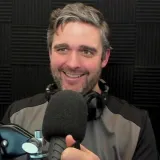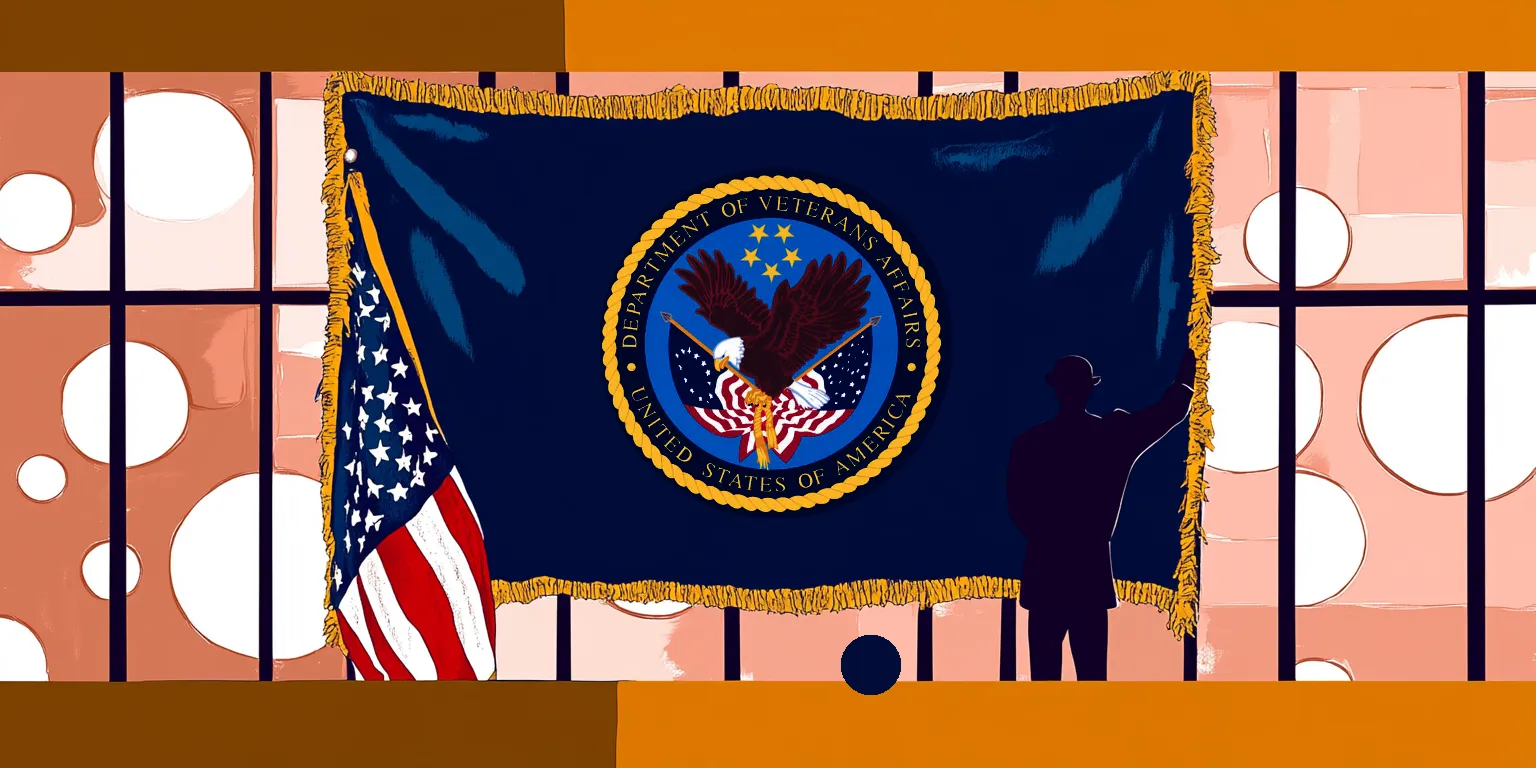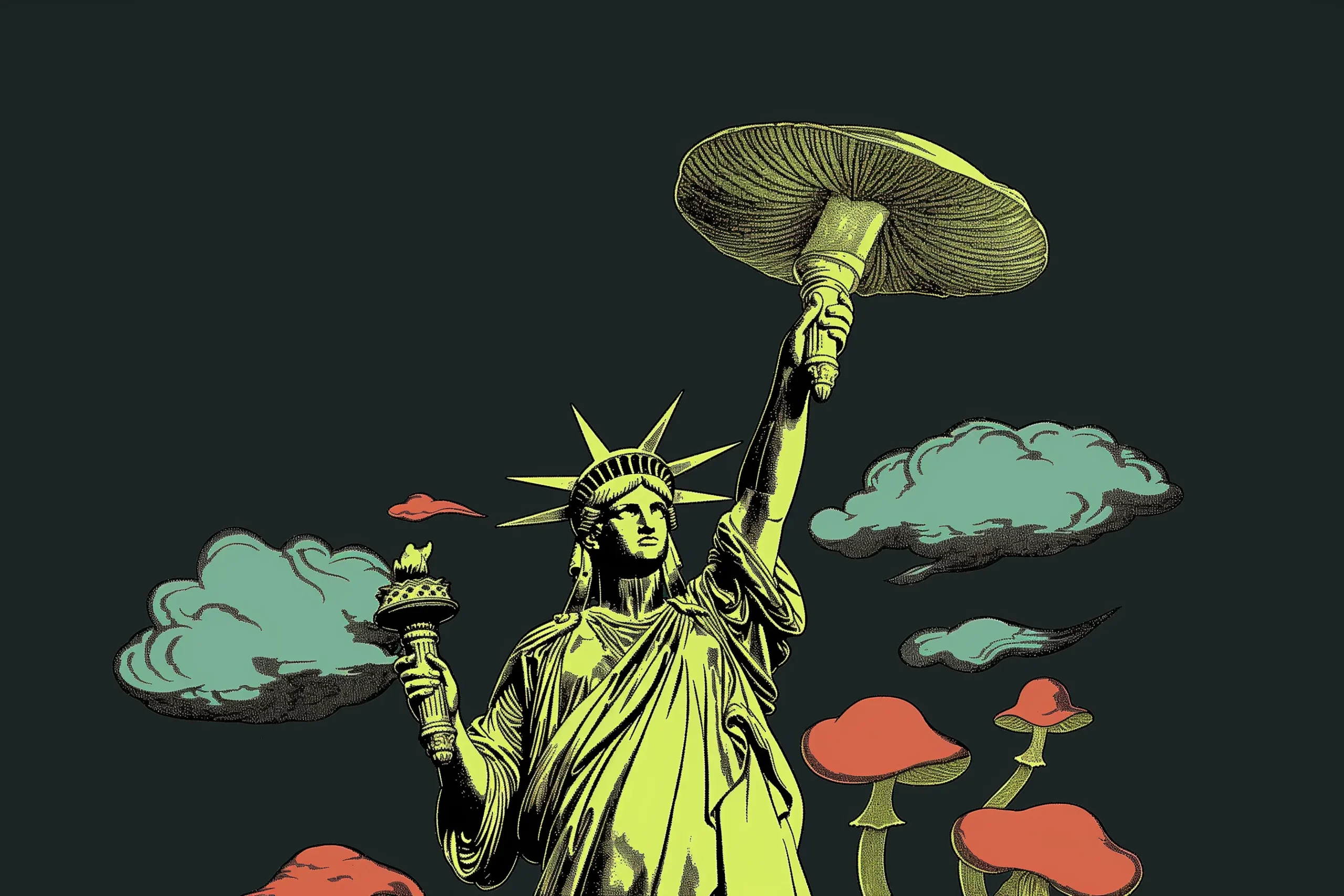In this week’s Psychedelic News Roundup, a novel crusade is underway in the heart of Ukraine amid the relentless strife of war. Medical experts, recognizing the profound mental toll of sustained conflict, are advocating for an unconventional solution: the legalization of therapeutic psychedelics. Other psychedelic news includes discoveries about the interaction of psychedelics and the Default Mode Network (DMN), and the launch of Clear Mind Medicine’s new alcohol use disorder research partnership with two Ivy League universities.
Psychedelic Therapeutic Frontiers in Wartime Ukraine

As covered by DW News, amidst the mental health crisis exacerbated by the war with Russia, Ukrainian experts are advocating for the legalization of psychedelics such as LSD, psilocybin from magic mushrooms, and MDMA for therapeutic use, particularly to treat PTSD in soldiers. Ksenia Voznitsyna from the Ukrainian Health Ministry is leading the campaign, pushing for legislative changes to allow psychedelic-assisted therapy, which she believes can expedite the healing process in complex cases unresponsive to traditional treatments.
Psychedelic-assisted therapy involves conversational psychotherapy while patients are under the influence of substances like psilocybin or MDMA, conducted in clinical settings under professional supervision. This method requires up to eight hours per session and is gaining traction in Ukraine despite traditionalist opposition. In the U.S., this approach is supported by veterans’ organizations and the Department of Veterans Affairs, with MDMA therapy possibly being authorized by 2024 following encouraging phase-three study results.
Research on psychedelics is active in Europe, with the European Medicines Agency conducting multiple studies on MDMA and psilocybin. In Germany, a trial on psilocybin for treatment-resistant depression is showing promising results for early-stage intervention. However, experts like psychiatrist Gerhard Gründer remain skeptical, especially regarding the ethical implications of such therapies in a war zone, cautioning against the risks of retraumatization and the complexities of using psychedelics in clinical trials for PTSD.(1)
Keep Up with Uncensored Psychedelic Trends
Join our newsletter at Psychedelics Uncensored.
We respect and protect your privacy. By subscribing your info will be subject to our privacy policy . Unsubscribe easily at any time
Rewiring the Mind: Psychedelics’ Influence on Brain Networks

A story, originally run by Psychedelic Spotlight, highlights new information that is contrary to previous research that suggested psychedelics suppress activity in the Default Mode Network (DMN), a hub associated with introspection and self-awareness, a novel study indicates these substances may actually stimulate parts of the DMN. This new understanding extends to the Theory of Mind (ToM) Network, which is crucial for empathy and perspective-taking. The overlap of these networks under the influence of psychedelics could explain the profound sense of connectedness and altered self-perception reported during psychedelic experiences.
A meta-analysis of 88 studies encompassing over 2,000 participants revealed that specific brain regions, notably within the cingulate cortex, are implicated in both the DMN and ToM functions. These regions are active during rest (associated with the DMN) and social cognition tasks, suggesting that the DMN’s role in social cognition may be more generalized than previously thought. This finding challenges the hypothesis that the DMN and ToM are distinct networks, hinting at a more integrated approach to understanding social cognition.
These insights offer exciting implications for the therapeutic potential of psychedelics, particularly in conditions characterized by social cognition deficits like autism and neurodegenerative diseases. By affecting the brain regions that underlie our social interactions and self-reflection, psychedelics might enhance the ability to empathize and connect with others, offering a valuable tool in the treatment of these disorders. This study underscores the complexity of the brain’s social circuits and the potential role of psychedelics in navigating and potentially healing these intricate pathways.(2)
A New Horizon for Veterans’ Mental Health

The Military Times‘ recent article discusses how Juliana Mercer, a 15-year Marine Corps veteran, became an advocate for MDMA and psychedelic-assisted therapies to address mental health issues in veterans after her own healing experience with psilocybin in Costa Rica. MDMA has been recognized as a “breakthrough therapy” by the FDA for PTSD treatment, with promising results from clinical trials conducted by the Multidisciplinary Association of Psychedelic Studies (MAPS). These trials demonstrated significant improvements in PTSD symptoms, with a substantial portion of participants no longer meeting the diagnostic criteria for PTSD after treatment.
Keep Up with Psychedelic Trends
Get uncensored psychedelic news, events, and updates. Join Psychedelics Uncensored!
We respect and protect your privacy. By subscribing your info will be subject to our privacy policy . Unsubscribe easily at any time
The success of psychedelic therapies comes as a mental health crisis affects veteran communities, with high rates of PTSD and suicide. Despite this, current trials lack federal support and funding. Advocates like Mercer urge lawmakers to provide financial backing, especially as MDMA therapy nears FDA approval, expected by next year, with psilocybin treatments following a few years later. Lawmakers have responded by proposing amendments to the Veterans Affairs appropriations bill to set up pilot programs for breakthrough therapies, emphasizing the urgency to support veterans through these innovative treatments.
The proposed legislative amendment aims to fast-track research and access to psychedelic therapies within the VA, with bipartisan support emphasizing the potential of these treatments to revolutionize mental health care for veterans. The push comes amidst legislative delays and a pressing deadline that threatens to stall funding. Despite these challenges, advocates like Mercer view MDMA therapies as a beacon of hope for veterans who have PTSD, potentially transforming mental health care nationwide.(3)
Unlocking the Mind: The Potential of Psychedelic-Assisted Psychotherapy

As detailed by the High Times, recent studies have cast light on the transformative power of psychedelic-assisted psychotherapy, especially for those with terminal illnesses. Psilocybin, a psychoactive compound found in magic mushrooms, when combined with psychotherapy, has been shown to drastically improve patients’ mood and acceptance of their condition in just a single session. The profound psychological changes and the potential for lasting positive effects offer a beacon of hope for those grappling with end-of-life distress.
Advancements in neuroscience have shed light on the mechanics behind these therapeutic successes. Research from Yale indicates that psilocybin can stimulate the rapid formation of neural connections in the brain’s frontal cortex, promoting cognitive and emotional growth. This development of new neuronal pathways, or arborization, is believed to be a critical factor in achieving the significant improvements observed in patients undergoing psychedelic-assisted psychotherapy.
The article also notes the natural occurrence of DMT, a psychedelic molecule, in the human brain, positing its potential role in mental adaptation processes. However, it cautions that while the science of psychedelics promises revolutionary treatments for mental health conditions, the unpredictability of individual experiences, including the possibility of adverse reactions, underscores the need for controlled, therapeutic settings and further research.(4)
Clearmind Medicine Advances Psychedelic Trials for AUD with Top Universities

Announced via Yahoo Finance, Clearmind Medicine Inc. has partnered with Johns Hopkins University School of Medicine and Yale University for a landmark clinical trial targeting Alcohol Use Disorder (AUD). Their pioneering treatment, CMND-100, is based on MEAI, a proprietary compound intended to curb the severe impacts of AUD, which range from health detriments to social and occupational disruptions.
The clinical trial, titled CM-CMND-001, is set to be a rigorous, multi-center study spanning multiple nations. It aims to test the safety, tolerability, and pharmacokinetics of CMND-100 through oral capsules given daily over ten days. Participants will be evaluated for changes in alcohol and cigarette cravings, as well as alterations in drinking behavior and signs of depression.
This Phase I/IIa trial is designed to discover the maximum tolerable dose and to understand the pharmacodynamics of CMND-100 in both healthy volunteers and individuals suffering from moderate-to-severe AUD. CMND-100 is a novel psychoactive molecule reportedly able to reduce the desire to consume alcoholic beverages while exerting a euphoric alcohol-like experience. A secondary goal is to assess the potential efficacy of the treatment in reducing alcohol dependence and cravings, with an exploratory focus on its impact on depressive symptoms.(5)
From war-ravaged Ukraine to the halls of Ivy League institutions, psychedelic medicine is making headlines and alleviating suffering. New discoveries regarding the interaction of psychedelics with the brain and continued calls for legislative reform in Washington showcase a world ready for psychedelic medicine to finally become accessible for all. However, further research is needed to ensure that psychedelic medicine is not only safe but also highly effective, especially for those who need it most.
Sources

1. Should ecstasy and mushrooms be legalized to treat PTSD? – DW – 11/06/2023. (n.d.). Dw.com. Retrieved November 9, 2023, from https://www.dw.com/en/should-ecstasy-mushrooms-be-legalized-to-treat-ptsd/a-67313910
2. Holyanova, M. (2023, July 31). New Study Provides Insights into Psychedelics’ Impact on the DMN, ToM, and Social Cognition. Psychedelic Spotlight. https://psychedelicspotlight.com/new-study-provides-insights-into-psychedelics-impact-on-the-dmn-tom-and-social-cognition/
3. Perez, Z. (2023, November 8). Psychedelics may soon be available — sort of — to treat vets with PTSD. Military Times. https://www.militarytimes.com/news/your-military/2023/11/08/psychedelics-may-soon-be-available-sort-of-to-treat-vets-with-ptsd/
4. Thomas, S. S. (2023, November 9). Research Shows Science Behind Psychedelics, Psychotherapy’s Ability To Cause Quick Brain Changes. High Times. https://hightimes.com/psychedelics/research-shows-science-behind-psychedelics-psychotherapys-ability-to-cause-quick-brain-changes/
5. Clearmind Medicine Inc. (2023, November 9). Clearmind Medicine to Pioneer Psychedelic Clinical Trials for Alcohol Use Disorder with Ivy League Universities. Yahoo Finance. https://finance.yahoo.com/news/clearmind-medicine-pioneer-psychedelic-clinical-142000453.html?guce_referrer=aHR0cHM6Ly93d3cuZ29vZ2xlLmNvbS8&guce_referrer_sig=AQAAAKIuhY39DXOJzG9yC35498xnUMwDkXB-QE39xfhn8vMfKOdmVc9UqL1DXXS5rDagK9wXhlo1Ub4x7Dx5oNI_yi0IrQFeAbCfEuAKeTUKvKW-fHqr5KzCf5W2TVmOH_aAefjSHlUUF24SwvtT7SYeim6MGyAN4IAYCsCdpW9VNqaU&guccounter=2
This material is not intended as a replacement or substitute for any legal or medical advice. Always consult a medical professional about your health needs. Psychedelics are widely illegal in the United States, and readers should always be informed about local, state, and federal regulations regarding psychedelics or other drugs.

 David Connell
David Connell





 Ross Dillon
Ross Dillon 
